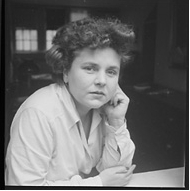 “When I think about it,” Elizabeth Bishop once wrote to James Merrill, “it seems to me I’ve rarely written anything of value at the desk or in the room where I was supposed to be doing it — it’s always in someone else’s house, or in a bar, or standing up in the kitchen in the middle of the night. . .”
“When I think about it,” Elizabeth Bishop once wrote to James Merrill, “it seems to me I’ve rarely written anything of value at the desk or in the room where I was supposed to be doing it — it’s always in someone else’s house, or in a bar, or standing up in the kitchen in the middle of the night. . .”
Bishop was a famously, almost proudly unproductive poet. She was such a perfectionist that The New Yorker actually pleaded with her to part with some of her manuscripts and send them in.
Sometimes, when paralyzed by self-loathing after too many days without writing, or after weeks squandered on incremental changes, I reread her correspondence. It was from her letters that I first learned some writers don’t put pen to paper every day. Her dry spells, sudden spurts of inspiration, and periods of tinkering remind me that there’s no one way to write, that all is not lost just because I fall off the wagon for a week or two.
Next year the Library of America will publish Elizabeth Bishop: Collected Poems and Other Writings.
The book includes correspondence, stories, translations, reviews, drafts of unfinished poems (if you missed the debate about these, go here), and, best of all, some personal essays I’ve never seen. In “The U.S.A. School of Writing,” Bishop recalls taking a job at a shady, correspondence-based writing school during the Great Depression. She responded to students’ submissions under the name Fred G. Margolies.